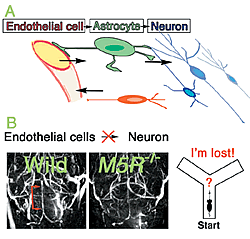Brain Functions Assumed by Neuro-Glio-Vascular Interaction
(B) Dysfunction of vascular endothelial cells leading to reduced brain blood flow and cognition function.
Neurons enable brain functions by forming the neural network, but the role of glia, another cellular component of the brain, in brain function is less commonly studied. The various types of glial cells outnumber neurons by a factor of ten. Astrocytes are a type of glial cell that coats 99% of the capillaries in the brain to extract glucose from the blood and bring it across the blood brain barrier. The glucose is metabolized into energy before it is delivered to neurons. In this way, the vascular endothelial cells and astrocytes are vital to neurons. Astrocytes that surround the neuron also regulate the level of a neurotransmitter called glutamic acid. This recent finding implicates astrocytes in neural circuit development and plasticity. We are investigating the role of the "neuro-glio-vascular" interaction between cells that control the neural circuit network. For this purpose, we created mice lacking essential astrocyte and vascular endothelial cell molecules to analyze the impact of these molecules on the surrounding cells and effects cellular group functions at the molecular, cellular, and individual levels.
Vascular Endothelial Disorder and Brain Functions
In Japan, people who are slow on the uptake are said to have poor blood circulation in the brain. Yet, how can blood circulation really influence brain function? We found that the basilar artery of transgenic mice lacking the M5 muscarinic acetylcholine receptor (M5 receptor) could not produce cerebrovascular dilation in the absence of acetylcholine (Yamada et al., 2001). This molecule acts on the M5 receptor in the vascular endothelial cells to dilate the vessel by means of nitric oxide (NO) emission. Magnetic resonance imaging, or MRI, showed that cerebral vessels were thinner and blood flow noticeably reduced on our M5 knockout mice (Araya et al., 2006). It would appear that vascular dilation of brain vessels requires acetylcholine.
M5 knockout mice that lost the ability to contract arteries needed to maintain a constant rate of blood flow also showed a permanent brain circulation disorder. Since this disorder resembled cerebral arterial sclerosis commonly seen in aged adults, we looked at the relationship between age-associated abnormalities in cognitive function and impaired brain circulation using these mice. In cognitive behavior tests, these mice performed less well than controls. We also observed atrophy of their hippocampal pyramidal cells that could explain the decrease in spontaneous firing frequency. The M5 muscarinic receptor represents about 2% of the total muscarine receptor is involved in the cognition function, and our findings suggest that this one controls cerebral blood flow that is essential for higher cognitive functions.
So how does a functional disorder of the vascular endothelial contribute to neurodegeneration? To answer this question, we are conducting studies that will reveal the function of these molecules, a process through which we hope to clarify the roles of the muscarine receptors in the cerebral vessels. Eventually, we hope that this expanded understanding will lead to new therapies and better cognitive function.







